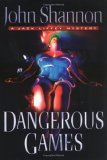 Dangerous Games by John Shannon
Dangerous Games by John ShannonMy rating: 2 of 5 stars
“Dangerous Games”, the sixth John Shannon’s novel that I read, is again a disappointing effort for me, although the plot is interesting and the rhythm of events is engrossing. A young Native American woman, Louisa, escapes from a rancheria (a small reservation) in Owens on the eastern side of the Sierra Nevada in California and moves to Los Angeles where she tries making it in the world of porn. Jack Liffey’s girlfriend, Gloria Ramirez, herself a Native American, is in a certain way related to Louisa and she asks Jack to search for her. A separate thread of the plot involves a Latino boy, Thumb, who is an aspiring artist and an apprentice gang member. In the third thread two young men shoot a series of Dangerous Games videos where they exploit homeless people to do life-threatening and demeaning things on film. Aside from Gloria, Jack’s daughter, Maeve, is involved in the events. Obviously, all these threads merge and culminate in a cinematic, if painfully contrived ending.
Ethnic gangs, employment of clueless young women in porn, and homeless people doing deadly stunts for meager pay are, of course, an everyday norm for California. The background and the premise of the novel are realistic and authentic. Alas, the portrayal of the City of Angels is not as vivid and deep as in Mr. Shannon’s previous novels. Instead of the trademark “weird LA scene” like, for instance, people throwing their possessions into their burning house, there is a lightweight sprinkle of weird moments. Sociological observations are pretty shallow, and the low-level pop psychology is abundant.
The writing in “Dangerous Games” is way below the high standards of the same author’s “The Orange Curtain”. No beautiful, lyrical passages. The philosophical, linguistic, and literary references are gone. Instead, there is a lot of artificially sweet, smarmy political correctness oozing from the pages. The author promotes the issues of diversity, so crucial and so life-and-death in Los Angeles, on the maturity level of an essay written by a middle-school student. The character of Trevor Pennycooke is a cheap and jarring cliché of a Jamaican man. The ending, as cinematic and well written as it is, sounds totally implausible. At least the author is wise enough not to “solve” al threads (as nothing is ever solved in real life).
Two and a half stars.
No comments:
Post a Comment